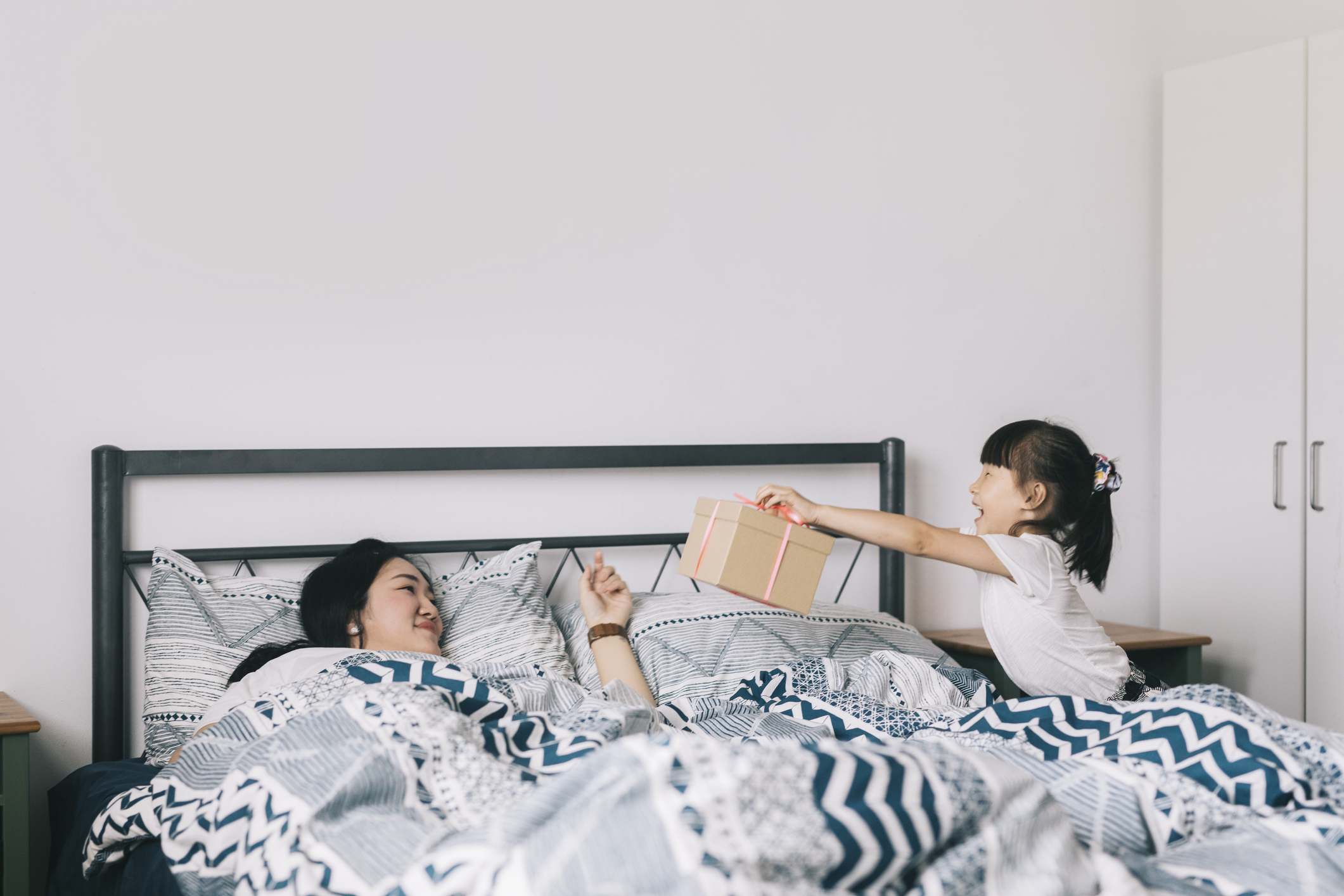We applaud them every night at 7:00 PM. We hang colorful signs in our windows to show our appreciation. They’re receiving Blue Angel flyovers and celebrity shout outs and are the focus of countless effusive emotional commercials. They’re essential workers — doctors, nurses, hospital cleaners, grocery store clerks, delivery workers, warehouse workers, sanitation workers, public transportation workers, first responders — and they’re holding up society as we navigate an unparalleled public health crisis that, to date, has no end in sight.
But there’s one type of essential worker that is being overlooked in this time of prolonged, collective crisis: moms. Perhaps it’s because moms’ unpaid labor has been largely dismissed as “not a real job” since forever; mothering is treated as a state of being for women, instead of the hard job and broader public service it is. Maybe it’s because prior to the spread of COVID-19, moms were already shouldering the majority of the parenting responsibilities, despite the fact that more of us are working outside the home and dads are more involved in their childrens’ lives than ever before.
Or maybe moms have been overlooked on the list of essential workers simply because we’re so used to ignoring the experiences and needs of mothers. Our country still lacks mandatory paid family leave, universal child care, equal pay, and any other systemic support that would amount to something substantial to bolter moms. When you’re told that your needs don’t matter, the implication is that your work and your service also don’t matter. As new moms, we’re told we’ll need a “village” in order to raise our kids, but for most of us, especially when it comes to how we feel within professional spheres and society at large, we’re used to feeling more isolation, uncertainty, and stress than meaningful support.
Which is to say: It comes as no surprise that moms are not being heralded as heroes right now. We’re doing what we’ve always done and largely getting the same amount of recognition for it that we always do.
But the fact is, moms are essential workers, and it’s not just being “being a mom is a hard job.” It’s because it’s an important job in terms of keeping our society functional right now. Moms are facilitating at-home e-learning for the nine out of every 10 children who are out of school right now. They’re working-from-home while simultaneously taking care of their young children; logging onto Zoom meetings as they change diapers, pick up toys, and try to keep that mythical nap schedule. They’re soothing their frustrated grade schooler, who just wants to go back to class and raise their hand in front of their teacher, not a computer screen. They’re making masks for frontline health care workers after they make lunch and before they make dinner. And since 52% of all essential workers are women — including 77% of health care workers and 53% of critical retail workers — moms are also self-quarantining away from their children. They’re giving goodnight kisses via FaceTime; missing critical moments when mom is needed; sacrificing silly morning dances with Elmo and late-night snuggles while they read Roald Dahl, so that they can care for other people’s babies, instead.
There will be no expensive, government-approved military fly-over for moms. When we take our children outside for a short walk — wearing our masks and reminding their energy-filled bodies to stay 6 feet away from anyone who passes us by — we won’t see a sign thanking moms for maintaining a sense of normalcy in the face of so much change and terrifying uncertainty. When this crisis is over, there won’t be a parade down the streets of New York City honoring the work moms are doing in this moment.
But just like late-night breastfeeding sessions, the times we caught our children’s vomit in our hands, early-morning trips to the ER for a high fever, and school lunches made at 6AM in a sleepless haze after staying up late returning work emails, moms are not doing this essential work for praise or recognition or even a thank you. We’re doing it because it must be done. Because what else is there to do? Because someone has to raise the children; it’s a fundamental part of society moving forward from this or any other moment. It’s not selfless — being a mom has rewarding aspects like any other job does — but it is something we do because of the love we have for our children, our families, and our communities.
And of course, women aren’t the only ones doing the work of raising kids, right now or any other time, but overwhelmingly, it is women. A reported 70% of women say they’re fully or mostly responsible for housework during lockdown, according to a poll conducted by Morning Consult for The New York Times. Sixty-six percent say they’re fully or mostly responsible for child care, per the same poll. This unequal division of labor is taking a toll on moms’ mental health, as well: a recent survey from the Kaiser Foundation found that 57% of mothers with kids under the age of 18 say their mental health has worsened since the pandemic. When we speak of the undue burdens placed on mothers, and the toll these burdens take, the point isn’t to ignore the many families where someone other than mom is doing the bulk of the parenting work (because undoubtedly those families are common) — the point is to shine a light on where the most need exists for the most people.
And now that half the country is reopening while schools and child care centers remain closed, it will likely be moms who continue to make sacrifices for the betterment of not only their children but also their parenting partners. In 2017, a study published in JAMA Internal Medicine found that moms are still sacrificing their careers for the sake of their families more than fathers are. So when this crisis passes us by and we return to “normal” — whatever that ends of looking like — moms will continue to be essential: for their children, for their partners, for the economy, and for our communities. In fact, there is no part of our shared life in society, no institution that we are striving to uphold during this time, that isn’t structurally underpinned by the tireless work of countless moms.
The point right now is to recognize this work, and not necessarily to make a flowery show of gratitude (although, to be sure, we’ll take the flowers), but to commit to fighting for moms the way they fight for their kids and communities. At HeyMama, for example, we are striving to do both with our #EssentialMoms campaign. We’re asking people to put up artwork that says “MOM” insides the front windows of their homes between now and Mother’s Day. Our hope is to fill as many windows as possible with these signs, so as moms take their children out for walks on Mother’s Day, they’ll see them and know how much they are loved and appreciated by their families, communities, and society at large. But since we know gestures only go so far, for every piece of artwork shared on social media, we’re also donating $1 (and up to $25,000!) to Together Rising, an initiative that provides mothers and families in need due to COVID-19 with resources, food, and essential items.
What we’re all going through right now feels like, among many things, a serious point for reflecting on how interconnected and interdependent we all are, which can make us feel so vulnerable and so powerful all at once. And when we stop to think of, thank, and support those who’ve been deemed necessary during this crisis — the people who make it possible for us to stay safe in our homes and the people who are treating and caring for those who are sick — we should be sure to include moms. Their essential physical and emotional labor will not only see us through this moment, but will lay the foundation for our uncertain future. And moms won’t skip a beat, because not only are they essential now — they always have been.


